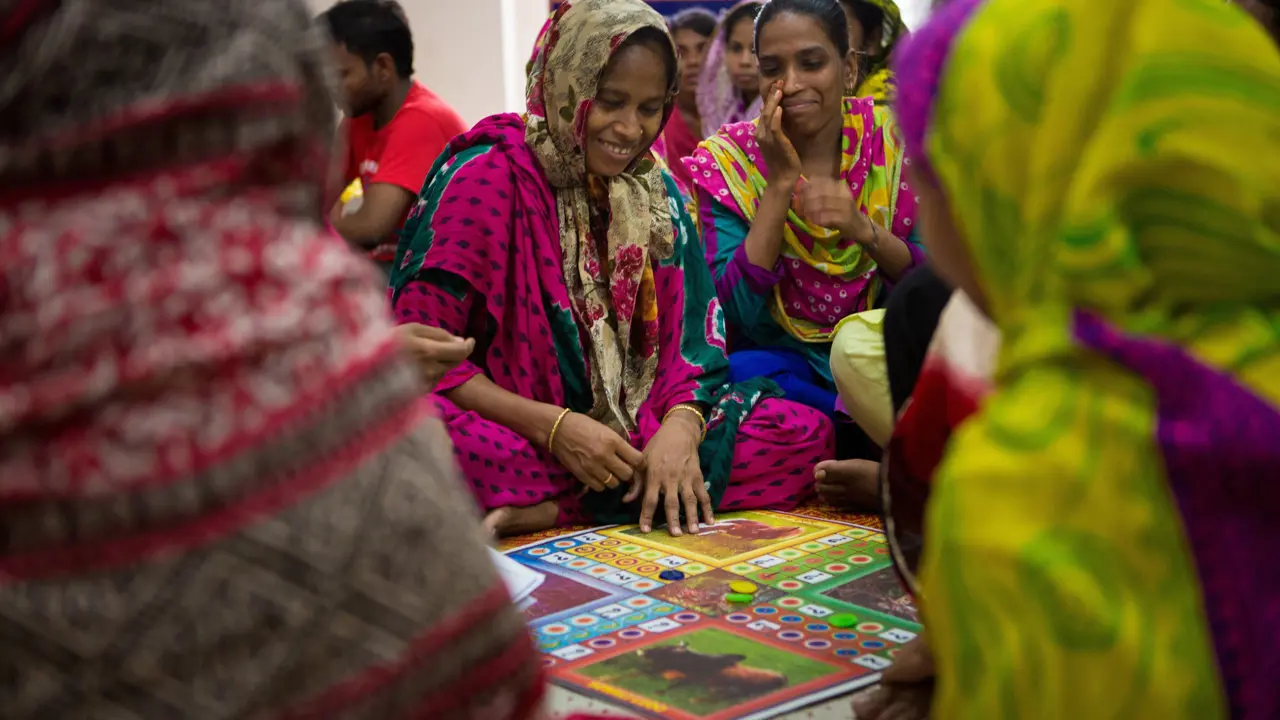UP! + Community-based, worker training programme, Bangladesh

Results
While the most notable success is in behaviour change at the individual worker level, fewer changes have been reported in the collective outcomes at the factory level
Behaviour change relating to health and finance as well as improved confidence reflected in an increase in individual workers raising workplace related disputes
Workers found life skills lessons very relevant and have incorporated them into their daily lives, resulting in positive outcomes at the individual level
However, collective outcomes have been fewer and improvements in working conditions have been made in 74 of the 75 factories where trainees work benefitting approximately 16,500 workers
Change in confidence and attitude led workers to be confident in communication with workplace management
Workers reported a sense of empowerment and increase in their self-confidence, with 94% workers stating they were confident in communicating with workplace management
Workers’ abilities to negotiate, bargain and claim have increased. Two third of the workers reported to have individually raised a workplace related dispute. More than 7 % workers claimed that they got satisfactory responses from dispute raising processes
Workers have negotiated on issues of leave, overtime, wages and festival bonuses
While the initiative is highly relevant to context and needs of the ready made garment sector workers in Bangladesh, the weakest changes in outcomes are related to women workers
While the initiative has a focus on women’s empowerment in both the domestic and work arena, the participation of women lessens (whilst still being in the majority) as workers progress through the different training levels
Increase in participation of women as members of a channel, worker committee or forum is only about 10% versus approximately 20% for women. Further there is still a nagging fear among workers about freedom of association
Four Collective Bargaining Agreements (CBAs) signed by Awaj were reported to be an indirect outcome of the initiative, spurring positive changes at workplace
An indirect outcome of the initiative is that workers have signed collective bargaining agreements with employers. The CBAs included many issues covering annual wage increase of the workers, attendance bonus, festival bonus, maternity leave, annual leave, medical facilities, day care, prayer room, canteen, snacks allowance and night duty allowance
The CBAs occurred as a result of the increased capacity of workers (trained through the initiative) to raise workplace related issues, negotiation and participation in basic unions
The initiative has filled a gap in taking an integrated approach in capacity building in best practice negotiation techniques for worker rights alongside other complementary worker rights initiatives active in Bangladesh
What did we learn?
C&A Foundation
To contribute towards systemic level change in the readymade garment sector, it is vital to strengthen the advocacy and communication activities. Increasing the number of workers’ upskilled on more complex negotiations and creation of unique worker-led bodies that are to resolve workplace issues with management will lead to improvement of working conditions and advocacy for sector-wide change
Women workers face substantial challenges from community pressure and lack of familial support can affect the participation of women in worker rights programmes. It is important to include ways to tackle patriarchal norms and sensitize family members for women to increasingly participate in similar worker rights initiatives and take a leading role in improving working conditions
For Partners & Others
A unique element of the initiative was its incremental approach with building life skills at an individual level and eventually leading to the strengthening of negotiation skills at a collective level that has proven to be a key driver of the success of the initiative
By holding worker trainings outside of factories in a neutral space, workers were able to benefit from a safe environment to share their thoughts and this also reduced bias towards access to workers from willing and compliant factories.
Engaging management at factory level, through training and dialogue, is needed to increase mutual trust, cooperation and commitment between workers and management/employers to improve working conditions